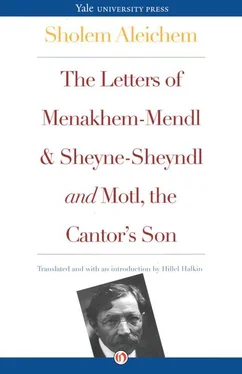To get back to the horses: they run around, the colts run after them, and I run after the colts. I’m a ball of fire on my feet. I go barefoot and dress light: a pair of pants, a shirt, and my tallis koton . When I race down the hill with it flapping in the wind, I feel I have wings and could fly.
“Motl! For God’s sake! Stand still for a second!”
That’s Pesye’s husband, Moyshe the bookbinder. He’s hurrying home from the fair with a bundle of paper. I’m afraid he’ll get me in dutch with my mother and Elye will give it to me, so I walk slowly over to him with my eyes on the ground. Moyshe puts down his bundle, wipes my sweaty face with the corner of his coat, and says sternly:
“Isn’t an orphan like you ashamed to run around with horses and Gypsies? And on a day like this! Have you forgotten your brother’s wedding? Get on home!”
“Lord-a-mercy! Where have you been?”
That’s my mother, clapping her hands and looking at my torn pants, sweaty face, and scratched feet. I have to hand it to Moyshe. He didn’t breathe a word about the fair. My mother washes me and dresses me in a new pair of pants with a little brimmed cap for the wedding. Don’t ask me what those pants are made of. They go on standing by themselves after I take them off and they make funny noises when I walk. Some pants!
“Rip these and we’re finished.”
So my mother says and I agree. The world could come to an end before you could rip a pair of pants like those. The most you could do is break them. The cap is an antique with a shiny black brim that you spit on and polish like shoes. My mother stands looking at me, tears of joy on her lined cheeks. She wants me to look good for the wedding. She says to my brother:
“Elye! What do you think? The boy is dressed like a prince, touch wood.”
My brother Elye looks at me and strokes his beard. I know what he’s thinking. He’s thinking that princes don’t go barefoot.
My mother pretends not to notice. She’s wearing a strange yellow outfit I’ve never seen before. It looks awfully big on her. I could swear I’ve seen it on Pesye. She has on her new silk kerchief, too. It still has all its crinkles. Don’t ask me to describe it because it keeps changing. It’s hot pink in daytime, yellow toward evening, and white at night, but it tends to green in early morning and sometimes it takes on a fine old shade of bright reddish dark greenish sky bluish colorless gray. You can’t knock a kerchief like that. It’s one of a kind. But it does look awfully strange on my mother. It doesn’t stick to her face. To be honest, it looks more like a man’s hat. Except even a hat goes better with a face than that kerchief.
Take my brother Elye’s hat. It looks like it’s growing out of his head. He’s shaved his long earlocks — shaved? cut them clean off! — and is wearing a white dress shirt with a stiff, pointy collar and a red and white tie with blue and green polka dots. What a tie! Not to mention his squeaky boots with the high heels. They’re supposed to make him look taller, those heels, but they help as much as cupping helps a corpse. Elye is on the short side. Actually, he’s not as short as he looks next to that big, tall, red-faced, splotchy-skinned baritone he’s marrying. I mean Brokheh, Yoyneh the bagel maker’s daughter. A fine-looking couple!
Enough of hanging around the bride and groom, though. I’d rather watch the band. And most of all, the bass fiddle and the kettledrum. That’s what I call instruments! If only I were allowed to play them. But I can’t even get near them without having a cheek slapped or an ear pulled. Those lowdown musicians would bite off the finger that touched anything.
If she were good, my mother would let me be a musician. She’ll never agree, though. It isn’t because she’s bad. It’s because Peysi the cantor’s son mustn’t be a common wage earner. That’s what she tells me when we talk about my future. Everyone’s worried about my future: my mother, Elye, Pesye, even Moyshe the bookbinder. Moyshe wants to take me on as an apprentice but Pesye won’t agree. She says such work is beneath a son of Peysi’s.
But here I am talking about myself and forgetting the wedding! The ceremony is over and we’re seated at the tables. The women and girls are dancing a quadrille. I blundered into it with my stiff pants and bounced off the dancers like a rubber ball. You should have heard what people said. “Get a load of the cavalier!” “He has two left feet and trips over both!” “I wish he’d trip right out of here!” Pesye began to shout (she was already as hoarse as a frog): “Are you crazy or are you crazy? The boy is the groom’s brother!”
That put them in their place. Naturally, I was taken and seated at the bride’s table. Three guesses who they sat me next to! Three hundred wouldn’t be enough. It was the bride’s little sister, Yoyneh the bagel maker’s daughter Alte! She’s just a year older than me and has two braids tied under her chin with a ribbon. She looks like a bagel twist herself.
Alte and I sat near the bride and groom and ate from one plate. Elye kept an eye on me to make sure I sat straight and used my fork and wiped my nose with my napkin and didn’t eat like a slob. To tell the truth, I didn’t enjoy that meal one bit. I don’t like being stared at. And to top it all off, Pesye lost her marbles. “I wish you health and happiness!” she shouted across the room to my mother. “Just take a look at these two lovebirds! A match from heaven!”
That brought over Yoyneh the bagel maker, all duded up. Pretty soon the rumor is going around that Alte and I are a couple. Yoyneh has this half-smile on his face. I mean, he’s smiling with his top lip and crying with the bottom one. Everyone is looking at us. Alte and I stared at the floor and poked each other in the ribs. I held my nose to keep from laughing and turned as white as a blister. Another second and it would have burst and made a fine scene. Luckily, the band struck up a dreamy tune and all the wedding guests went into a trance.
I looked up and saw my mother in her weird yellow dress and silk shawl. She was crying again. You tell me: is she ever going to stop?
My mother has news for me. I have a job! Not to worry, though: I haven’t been apprenticed to a tradesman. Her enemies won’t see the day when Peysi the cantor’s son becomes a common laborer. My new job is an easy one, a good one. I’ll go to school every day and spend the night at old Luria’s house. Old Luria, my mother says, is a rich man. The problem is that he isn’t well. That is, there’s nothing wrong with him: he eats, drinks, and sleeps like a normal person. He just doesn’t sleep at night. At night he never shuts his eyes. His children are afraid to leave him alone then. Someone, they say, should be with him. It can even be a child if he’s trustworthy. In fact, a grown-up would be bothersome. A child is no more noticeable than a cat.
“You’ll get five rubles a week and your supper,” said my mother. “A good supper, too, a rich man’s food! The leftovers from his table alone could feed our whole family. I’ll pick you up at school every day and bring you to old Luria’s. You won’t have to do any work there. And you’ll eat well and have a comfortable bed. Plus five rubles a week. I’ll be able to make some new clothes for you. I’ll even buy you a pair of boots.”
That sounds pretty good, doesn’t it? So why cry? But that’s my mother for you. It doesn’t count unless she’s cried.
I go to school but I don’t really learn. Sitting in a classroom isn’t for me. Mostly, I help the rabbi’s wife around the house and play with the cat. The housework is a lark. I sweep the rooms, help carry wood, and run errands. It beats learning any day. Nothing is worse than that. Kometz-alef-aw, kometz-alef-aw, kometz-alef-aw —how many times can you listen to the same old thing?
Читать дальше












